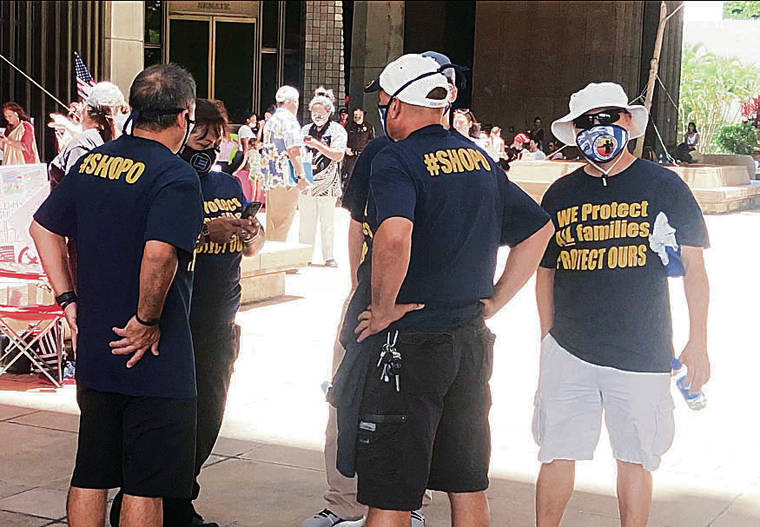The Legislature passed a police reform bill Monday that would make public the identities of
police officers who have been suspended or discharged, putting them on equal footing with other public agency employees.
House Judiciary Chairman Chris Lee said the bill would reverse a decision made 25 years ago to withhold the names of officers even after they have exhausted their grievance rights.
“For 25 years in Hawaii, we have, as a state, erred on the side of secrecy with respect to some misconduct records,” said Lee.
The names of other public employees who are disciplined or fired already become public record after the grievance process has been
exhausted.
Instead, the county police chiefs have been required to file reports with the state Legislature each year that describe some of the misconduct that led to suspensions and
terminations, but the reports do
not include the names of the officers involved.
House Bill 285 requires county
police departments to disclose to lawmakers the identity of an officer upon his or her suspension or
discharge.
Under the current law, the cause for termination or suspension does not necessarily reveal the full scope of the misconduct, and is typically a brief explanation.
This bill, however, amends the Uniform Information Practices Act
to allow for public access to information related to the suspension or discharge of a police officer.
The bill passed final reading in
the Senate with 20 in favor and four “no” votes. In the House, 14 of the
51 House members voted against the bill.
Although the bill comes on the heels of local and global protests
and calls for police reform after the May 25 death of George Floyd at the hands of Minneapolis police charged with murder, Lee reminded his colleagues that the bill was not a knee-jerk reaction to the Black Lives Matter movement or Floyd’s death.
HB 285 was introduced last year and held over to this year at the Legislature, and similar bills have been repeatedly introduced “for many, many years before that,” Lee said.
A few dozen members and
supporters of the police union, the State of Hawaii Organization of Police Officers, rallied at the state Capitol rotunda Monday morning in opposition to the bill.
They wore shirts saying, “We protect all families. Protect ours.”
SHOPO leaders said the bill would allow an officer who was suspended for as little as a day to be named, saying it violates their due-process rights provided by the County Civil Service Rules and the collective bargaining agreement with all Hawaii counties.
They say that the suspensions could be for something as small as
tardiness.
State Rep. Sharon Har (D, Kapolei-Makakilo) cited arguments made by SHOPO that the measure would expose the names of police officers who are accused of misconduct before they are allowed due process, which includes the right to grievance hearings on their suspensions or firings.
“It adjudicates someone guilty before they’re actually found guilty,” said Har, who voted against the
measure.
SHOPO Treasurer Kimo Smith,
a Honolulu Police Department sergeant, says that a police sergeant or lieutenant can immediately suspend a subordinate before an investigation is even started or completed. That is often necessary because, he says, “We carry a badge. We carry a gun.”
That suspension could include alleged administrative and/or conduct violations, and he said naming an
officer before a full investigation is premature.
He said that if the bill becomes law, “internal policies have to change.”
The passage of this bill would allow a prospective employer to see whether a former police officer had been suspended or terminated and perhaps avoid hiring a former officer who is unsuitable for the job, supporters said.
HB 285 authorizes the law enforcement standards board to revoke certifications and requires the board to review and recommend statewide policies and procedures relating to law enforcement, including the use of force. The bill gives the law enforcement standards board until Dec. 31, 2021 to finalize its standards and certification process.
SHOPO President Malcolm Lutu said at the rally that Honolulu Police Chief Susan Ballard could not physically stand with them there but that she stood by HPD’s rank and file.
Ballard told the Honolulu Police Commission at its last meeting in June that HPD does not need police reform, unlike police departments in other states.
She said Honolulu had a relatively small number of officer-involved shootings. “That’s nothing” compared with mainland police departments, she said.
She said one priority is for HPD’s undercover officers in the Crime Reduction Units to receive immediate training on deescalation and be given less-than-lethal tools, since they currently carry only handguns. CRU officers have been involved in some of the past two years’ fatal police
shootings.

